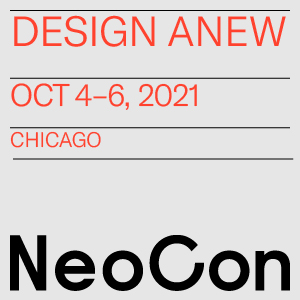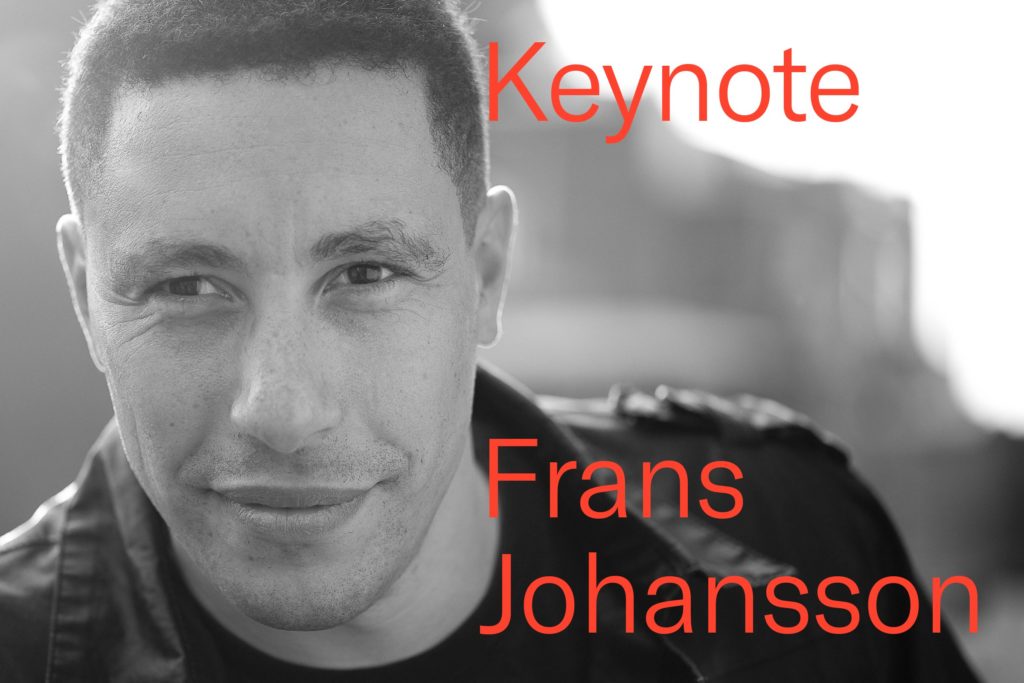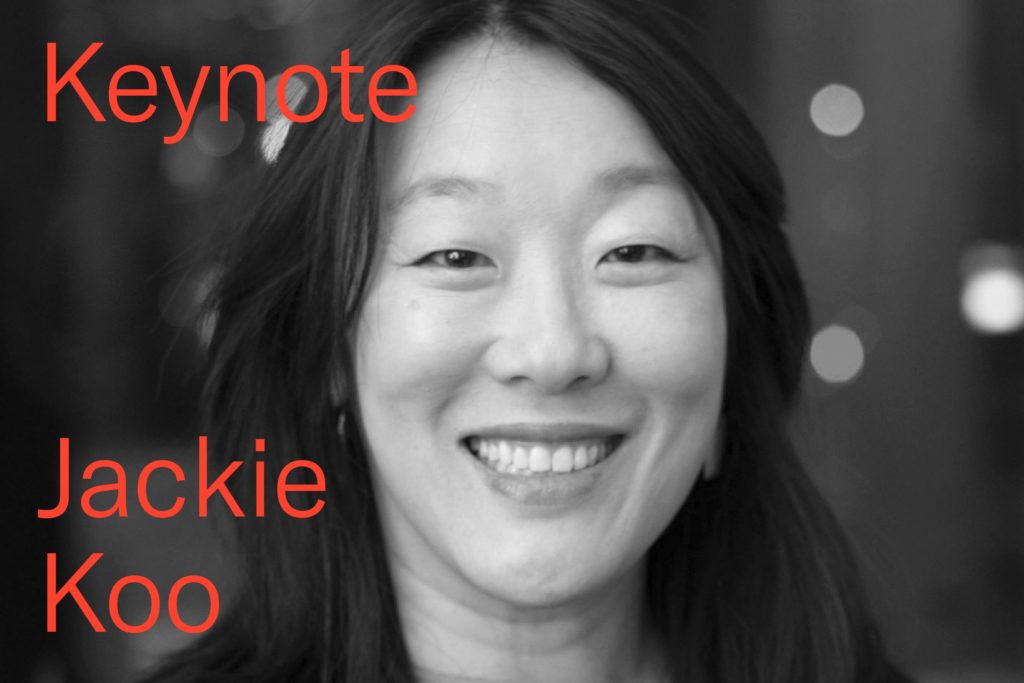Oct. 4-6: How will we Design Anew? NeoCon delivers in-person and virtual programming

NeoCon 2021, themed Design Anew, will be held October 4-6 at theMART in Chicago, featuring a lineup of onsite and virtual educational presentations that will explore topics within the evolving sectors of workplace, healthcare, hospitality, education, and more.
The show has tapped thought-leaders including Jeanne Gang, founding principal and partner, Studio Gang; Frans Johansson, author and CEO, The Medici Group; and Jackie Koo, founding principal, KOO, to deliver the 2021 in-person keynote addresses. These sessions will be complemented by in-person special programs led by Todd Heiser, principal and co-managing director, Gensler Chicago and Sheryl Schulze, principal and studio director, Gensler Chicago; Lauren Rottet, founder, Rottet Studio; and Marti Konstant, workplace futurist and author. There will also be virtual CEU sessions to watch live online or on-demand up to 30 days following the event.
“Whether it is groundbreaking new ways of approaching wellness and sustainability, the growing convergence of the commercial and residential sectors, or the powerful intersections between innovation & strategy and diversity & inclusion, NeoCon 2021’s programming will offer an exceptional opportunity to come together, discuss, evaluate, and learn from each other,” said Lisa Simonian, VP of Marketing, theMART.
2021 Keynotes and Special Programming will be presented onsite at NeoCon and also available for viewing via livestream. Onsite attendance will have limited capacity and programming registration is required. Livestreams will be available to all NeoCon registrants via NeoCon’s new online platform, the NeoCon Hub (and do not require separate registration). Visit neocon.com for the list of keynotes, special programs, and Virtual CEU sessions. Registration is open.
Monday, October 4
- Keynote: “Furniture for the City”: Recasting Urban Design through Micro-Activation
Jeanne Gang, Studio Gang at 11:00 a.m. CDT
The past year has underscored the vital importance of urban public space for sustaining individual wellness, building and maintaining community connections, and enhancing the livability of our cities. Through an exploration of a diverse set of Studio Gang’s projects – ranging from large-scale residential work, like the Mission Rock development in San Francisco, to in-depth community engagement and planning efforts in Chicago, Founding Partner Jeanne Gang will demonstrate how we can rethink design strategies to make cities more inclusive and equitable. In particular, she will discuss how principals regularly applied at the furniture scale foster a greater sense of welcoming, inclusivity, and comfort for all citizens when deployed on the urban scale. - Special Program: theMART 2.0: A New Era
Todd Heiser and Sheryl Schulze, Gensler Chicago, at 2:00 p.m. CDT
Gensler is collaborating with theMART to imagine an exciting new future for the building. The Merchandise Mart has long been at the center of creativity and commerce in the city, and this session will explore its evolution as it takes on a new relevance to best serve the design and business communities of Chicago and beyond. Key areas of focus in the design plan are the first and second floors of theMART. As the nexus of activity where the public, conference-goers, and tenants intermingle, the session will explore how the proposed new design will encourage and reflect this confluence while respecting the legacy of the storied building.
Tuesday, October 5
- Special Program: You’ve Got to be From the Future to Design a Resilient Workplace: From the Sketchbook of a Workplace Futurist, Design Thinker, and Agility Researcher
Marti Konstant, Workplace Futurist, 9 a.m. CDT
The future is flexible. In response to the significant changes of the past year, the shape-shifting of the workplace is in motion. As Steelcase reflects in its research, “Be prepared to experiment.” The future of work combines the tectonic plates of workplace trends, human behavior, and technology development to form the next generation of the distributed work environment. The pandemic accelerated the creative work arrangements and distributed teams that were already in place on a smaller scale. Flexible systems and an agile mindset that reframe design and workplace behavior preferences will accommodate individual and organizational needs as they continue to shift. The presentation will cover trends that impact the future workplace and strategies to usher in the big shift: employee behavior; employer assumptions; emerging workstyles; the distributed workplace; technology; and learning, presentations and meetings.

- Keynote: The Medici Effect: Innovation at the Intersection
Frans Johansson, The Medici Group 11 a.m. CDT
Author, entrepreneur and acclaimed international speaker Frans Johansson will share why the most powerful intersection in the world today is between innovation & strategy and diversity & inclusion – and what this means for the community and the individual. Diverse and inclusive teams play a critical role in navigating a fast-moving world and will be the source of the next generation of game-changing ideas. Throughout this talk, Frans will demonstrate that diversity and inclusion are imperative to the success of organizations’ growth, and in fact, they are the ultimate drivers for innovation.

Wednesday, October 6
- Keynote: Taming Push Me Pull You: KOO’s Integrated Architectural and Interior Design Practice. Jackie Koo, KOO, 11 a.m. CDT
Jackie Koo, founder of the eponymous firm KOO, architect and interior designer of the recently completed Sable Hotel on Navy Pier, and interior designer of the hotel at the historic Old Cook County Hospital, will discuss how the best places and spaces are created by both architectural and interior design forces working in the same direction.
This year’s CEU accredited programs will be exclusively virtual and feature a roster of industry experts including:
- Verda Alexander, co-founder, Studio O+A.
- Cheryl Durst, executive vice president/CEO, IIDA.
- Anastasija Lesjak, co-founder & creative director, 13&9.
- Arnold Levin, southwest regional consulting practice area leader, Gensler.
- Kay Sargent, Director of WorkPlace, HOK.
- Jon Strassner, director of industry partnership, ASID.
Tracks include Workplace; Wellness; Sustainability; and Healthcare; as well as Design Skills 1, which explores experiential graphic design, color, lighting, acoustics and concept development; and Design Skills 2, which focuses on ESG (Environmental, Social and Governance), equity, industry standards, IPD (integrated Project Delivery), and research tools.
CEU sessions can be accessed when they run live online, or can be viewed at any time on demand (for accreditation) October 8 through November 6. CEU program tracks are $125/track or $100/track when more than one track is purchased. Advance registration is required. Session highlights include:
Monday, October 4
- CEU Sustainability Track: So a Designer and an Activist Walk Into a Bar…
Verda Alexander, Studio O+A and Jon Strassner, LEED AP, ASID, 12 p.m. CDT
Join Verda Alexander and Jon Strassner for a special narrative compiled of over 30 episodes of their podcast, “Break Some Dishes.” Going back through their very special curation of conversations and interviews, Verda and Jon share a story focused on bringing Green Science innovations and inspirations to the interior design industry. Designers can and should act now to make changes to how they specify product and materials. - CEU Design Skills 1 Track: Discovering Nature’s Crossover Colors: Updated Trends in Classics. Leatrice Eiseman, Eiseman Center for Color Information & Training, 3 p.m. CDT
The question about color that often arises is: “How do color trends impact the lifespan of a product, a setting, interiors and exteriors? How do you select the long-lived colors? What hues are considered timeless? The answer is that there are classic colors included in a group of hues called ‘crossovers.’” They are the colors that appear so frequently in natural settings that the human eye becomes accustomed to seeing them in many applications and contexts. They are considered classics, basics and staples, and, as such, they enjoy a long shelf life and greater longevity. This illustrated talk will give a “macro view” of how the classics and crossovers can help in the selection, application, marketing, design and presentation of color.
Tuesday, October 5
CEU Workplace Track: Solving The Right Problem: Strategies for a Re-imagined Future of Work. Arnold Levin, Gensler, 1:30 pm CDT
The pandemic has created new paradigms for a reimagined normal that puts into question the successes of the old normal while at the same time creating two camps of thinking about the future of the workplace. Strategies are being explored that reimagine the future. This presentation will look at how these strategies should not be viewed purely as a response to conditions created by the pandemic but as opportunities to reinvent perspectives around work and place and to question many of the assumptions that have driven workplace strategies pre-pandemic. Levin will look at those elements of the old normal that design solutions arising from a pandemic and post-pandemic perspective have proven to be ill-conceived and what opportunities exist now to create a new vision driven by redefining an organization’s definition of both work and place. More importantly he will explore if our polarized discourse around the post-pandemic workplace is really solving the right problem.
Wednesday, October 6
- CEU Wellness Track: Fractal Vision: A Stress-Reductive Approach to the Built Environment. Anastasija Lesjak, INNOCAD / 13&9 Design; Richard Taylor, University of Oregon; Jackie Dettmar, AIA, IIDA, Mohawk Group, 9 a.m. CDT
From decreasing stress to improving physical health, nature has a significant influence on well-being. Design can be a tool to solve the challenges of an increasingly digitized society and help end users find balance between nature and built environments, especially commercial spaces. Fractals are intricate patterns that occur naturally throughout our surroundings, from clouds and trees to blood vessels and neurons. Research has shown that stress levels can reduce by as much as 60% when an occupant of these spaces experiences and views mid-complexity fractal patterns. Their harmonic repetition triggers a natural relaxation effect. Attendees of this presentation will explore this approach to design by using fractal concepts, and learn how to integrate finishes and overall structures based on stress-reductive patterning using real-world examples. - CEU Healthcare Track: International Healthcare Planning and Design in the Age of Infectious Disease. Mark Banholzer, AIA, NCARB, LEED, HOK; Heather Fenniman, HOK; and Will McConnell, AIA, LEED, HOK. 10:30 a.m. CDT
The United States has a National Pandemic Strategy and an implementation plan centered on three pillars: preparedness/communication; surveillance/detection; and response/containment. While most of these plans are concentrated on protocols/procedures that hospital staff and administration follow, few US hospitals are designed with flexibility allowing immediate physical change to enhance infection control during pandemic outbreaks. This presentation demonstrates planning and design strategies of 3 international facilities from Canada, the UK and Southeast Asia. The lessons learned during the SARS outbreak in 2002 results in a unique approach to hospital design. These facilities have features designed to contain airborne infections, including instantaneous flexing from normal operation to pandemic treatment mode through spatial and mechanical system changes. This understanding is vital with the current Covid-19 global pandemic and future new infectious diseases.
NeoCon is open to the design trade, facilities managers, C-Suite executives, and other industry-related professionals.
